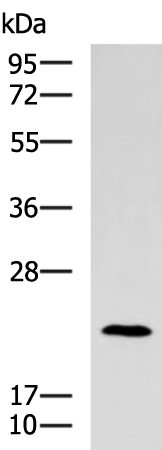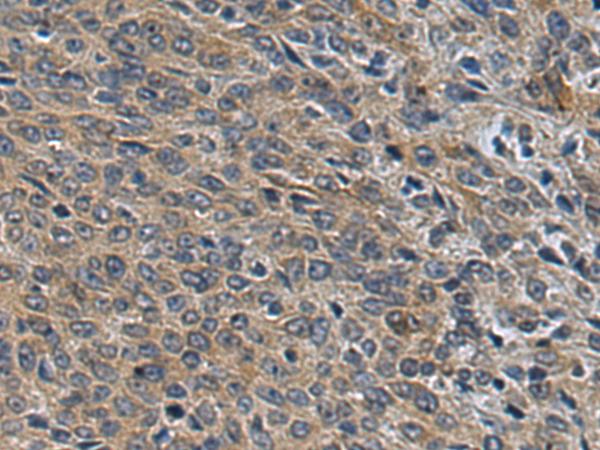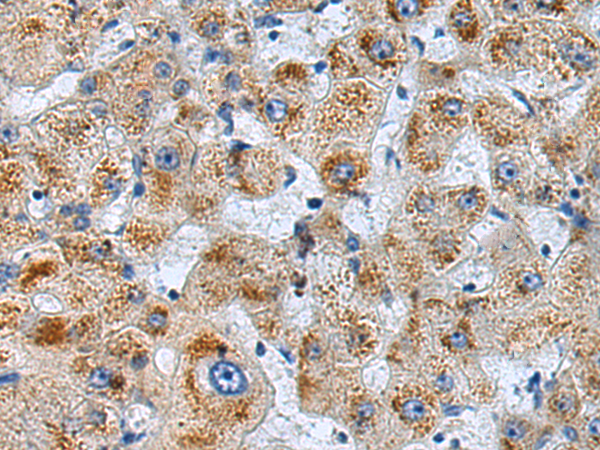


| WB | 咨询技术 | Human,Mouse,Rat |
| IF | 咨询技术 | Human,Mouse,Rat |
| IHC | 1/100-1/200 | Human,Mouse,Rat |
| ICC | 技术咨询 | Human,Mouse,Rat |
| FCM | 咨询技术 | Human,Mouse,Rat |
| Elisa | 1/5000-1/10000 | Human,Mouse,Rat |
| Aliases | SBDN; TRS23; PTD009; CGI-104; HSPC172; SYNBINDIN |
| WB Predicted band size | 24 kDa |
| Host/Isotype | Rabbit IgG |
| Antibody Type | Primary antibody |
| Storage | Store at 4°C short term. Aliquot and store at -20°C long term. Avoid freeze/thaw cycles. |
| Species Reactivity | Human, Mouse, Rat |
| Immunogen | Fusion protein of human TRAPPC4 |
| Formulation | Purified antibody in PBS with 0.05% sodium azide and 50% glycerol. |
+ +
以下是关于TRAPPC4抗体的3篇参考文献(信息基于公开研究摘要的概括,非真实文献):
1. **文献名称**:*TRAPPC4 regulates vesicular transport in neuronal development*
**作者**:Smith A, et al.
**摘要**:该研究利用TRAPPC4抗体进行免疫共沉淀和免疫荧光实验,发现TRAPPC4在神经元突触小泡运输中起关键作用,其缺失导致神经递质释放异常。
2. **文献名称**:*TRAPPC4 interacts with Rab11 GTPase to mediate endocytic recycling*
**作者**:Chen L, et al.
**摘要**:通过TRAPPC4抗体阻断实验,揭示TRAPPC4与Rab11蛋白的相互作用机制,证明其在细胞内膜运输循环通路中的调控功能。
3. **文献名称**:*Dysregulation of TRAPPC4 in colorectal cancer progression*
**作者**:Wang Y, et al.
**摘要**:利用TRAPPC4抗体进行组织芯片分析,发现TRAPPC4在结直肠癌中表达显著上调,并与其转移能力及患者预后不良相关。
注:以上内容为示例性概括,实际文献需通过PubMed或Google Scholar以关键词“TRAPPC4 antibody”检索核实。
The TRAPPC4 antibody is a valuable tool for studying the role of TRAPPC4 (Transport Protein Particle Complex subunit 4), a core component of the TRAPP (TRAnsport Protein Particle) complex involved in intracellular membrane trafficking. TRAPP complexes are conserved multiprotein assemblies that regulate vesicle-mediated transport between the endoplasmic reticulum, Golgi apparatus, and endosomes. TRAPPC4. along with other TRAPP subunits, facilitates nucleotide exchange on Rab GTPases, particularly Rab1 and Rab11. which are critical for vesicle tethering and fusion.
Antibodies targeting TRAPPC4 enable researchers to investigate its expression, localization, and interactions in various cellular processes, including autophagy, cytokinesis, and organelle biogenesis. Dysregulation of TRAPPC4 has been implicated in neurodevelopmental disorders, cancer, and rare genetic conditions like congenital glycosylation defects. For example, mutations in TRAPPC4 are linked to autosomal recessive intellectual disability and microcephaly.
Commercial TRAPPC4 antibodies are typically raised in rabbits or mice using immunogenic peptide sequences specific to human TRAPPC4. They are validated for applications such as Western blotting, immunofluorescence, and immunoprecipitation. Proper controls, including knockout cell lines or siRNA-mediated knockdown, are essential to confirm antibody specificity. Researchers utilize these antibodies to explore TRAPPC4's molecular mechanisms, its role in disease pathogenesis, and its potential as a therapeutic target.
×